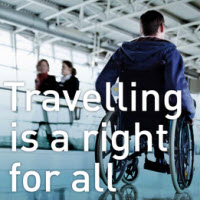Delivering Excellence to Disabled Passengers Key To Success In Air Travel Industry
- Written by Roberto Castiglioni
 A single day doesn’t go by without me hearing an airport’s dissatisfaction about an airline’s poor pre notification performance, a service provider moaning about HR management, an airline manager furious about passengers' complaints of poor service airports provide. However, complaining means nothing if parties do not talk to each other.
A single day doesn’t go by without me hearing an airport’s dissatisfaction about an airline’s poor pre notification performance, a service provider moaning about HR management, an airline manager furious about passengers' complaints of poor service airports provide. However, complaining means nothing if parties do not talk to each other.
To make things worse, more often than not the passenger with special needs is the one paying the price for the breakdown in communication, caught in the cross fire of this endless blame game.
The effect of a negative travel experience is devastating for the passenger and usually a significant loss for the air travel industry as a whole. According to my independent research among passengers with disabilities, 78% of passengers with special needs caught in an adverse experience when flying will stop traveling by air. On average, passengers with disabilities travel in a party of three. 38% of passengers with special needs assess their methods of transport on word of mouth.
In other words, every time the air travel industry lets down a passenger with special needs the actual loss potentially amounts to 10 to 12 passengers in total.
Turn the equation around, deliver excellence, and every time a disabled passenger has a seamless travel journey by air, he or she may influence and entice 10 to 12 more people to travel by air.
A survey conducted on behalf of esaag on a significant sample of airline customers shows that passengers with reduced mobility who had a positive travel experience are twice more likely to remain loyal to the airline than able bodied passengers. Fidelization is essential to any successful business.
I think the numbers above will draw professionals’ attention towards a niche destined to grow exponentially in the next 15 to 20 years. When we include the over 65s and the deaf, we are looking at somewhere between five to ten per cent of the traveling public.
The key to success is achieving delivery of excellence. Easier said than done some may think. Quite the contrary, I believe. What the industry needs is a fresh, out of the box approach to assisting the needs of passengers with disabilities traveling by air. Greater coordination, better communication, revision and standardization of laws and regulations, revision of quality, nature, and delivery process of services are the pillars upon which airports and airlines can meet the challenge.
What’s best is that procedures, processes and solutions for passengers with special needs can easily translate into better services for all passengers, hence matching the ever evolving needs of the traveling public and increase positive perception.
Mark my words: the first to get this right will set the new benchmark of quality in air travel and will become the dominant hub or carrier for decades to come.
About the author
Roberto Castiglioni is an industry acknowledged expert of all aspects of access to air travel for passengers with different abilities. Providing Civil Aviation authorities, airports, and airlines strategic guidance, practical advice, and cutting edge solutions to support the evolving needs of passengers with special needs is his mission statement. Roberto is a member of the UK Civil Aviation Authority Access To Air Travel Working Group and the Easyjet Special Assistance Advisory Group.










